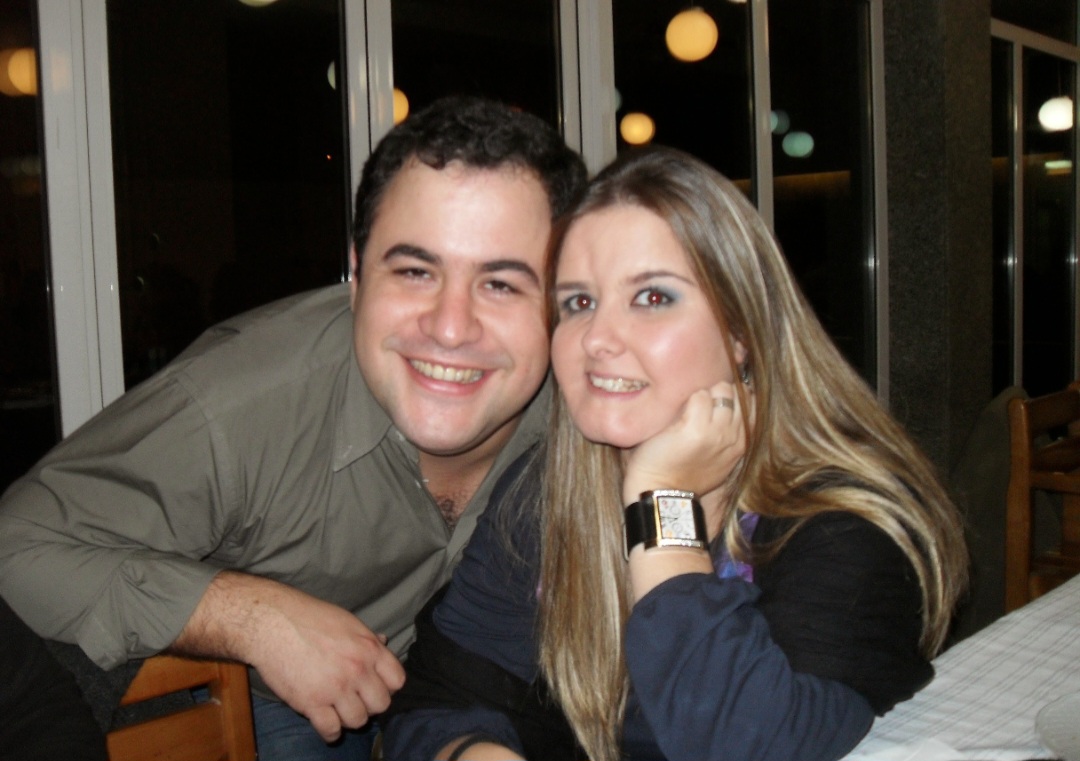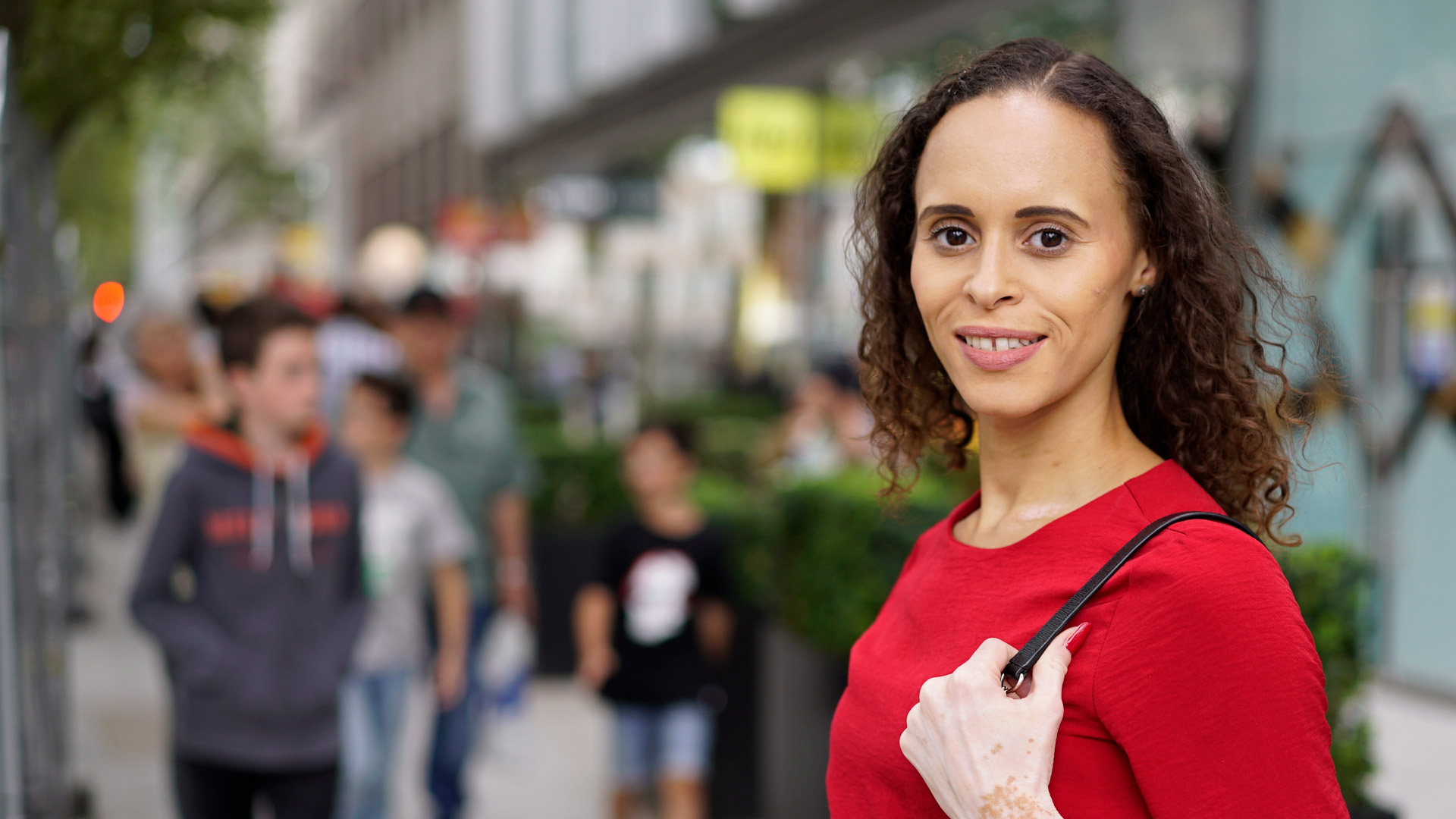I’m Izzy and I have a condition called Parry Romberg Syndrome, which affects the right side of my face. I was about three years old when the condition started to develop and I was diagnosed as a child.
But I’m much more than my condition. I am a sister, a daughter, a niece, a partner and a joyful owner of three beautiful Labradors. I’m Portuguese and I have lived in the UK for over 10 years. I also have a background in nursing – partly inspired by the fantastic care I received from other nurses when I was growing up.
It all began when I was three years old. My grandparents started noticing a shadow on the right side of my face, which they thought was dirt at first – they tried to wash it off. As time went on and it didn’t go away, I started to get examined by lots of specialists. But nobody understood what was happening. Between the ages of seven and nine, my plastic surgeon contacted numerous American, British and German specialists who seemed equally as confused. Nobody in Portugal had been identified to have Parry Romberg Syndrome before, but although it would take some years for me to receive an official diagnosis, my doctors suspected that this was what I had.
One day, when my brother came upstairs to say goodnight to me, I remember saying to him: ‘Why me? Why am I different?’
As my condition progressed, the right side of my face didn’t develop in the same way as the left side and I started to live life with a visible difference. The tissues and bones around my cheek and jaw were affected, and my right ear is very small compared to my left as it hasn’t grown since I was three. I had over 50 surgeries before I was 26 to rebuild the damaged muscle and skin and I underwent plastic surgery to make my face more symmetrical. Hospital felt like a second home. Although recovery was tough I have fond memories of the healthcare workers who took care of me and am very thankful that my experiences were positive.
I noticed that I looked different when I was about six years old, as I started primary school. The memories I have from my childhood aren’t great – children can be cruel; we all know that. I was ostracised for looking different – excluded from games, called names and made to feel left out and like I didn’t belong.
This continued for years. Becoming a teenager was even tougher. I remember having a particularly hard time at fourteen years old. One day, when my brother came upstairs to say goodnight to me, I remember saying to him: “Why me? Why am I different?”
While children are cruel, children are children. Adults should know the difference between right and wrong and that it’s rude to stare or make comments about someone based on their appearance. I’ve even experienced somebody on the bus poke my face with her finger – asking me: “does this hurt?” This one minute of ignorance knocked my confidence drastically at the time.

Izzy with her brother, José
My self-esteem has been up and down over the years due to these experiences – which are typical to people who have visible differences. But overall, I am a very strong person. My family is full of strong-willed personalities so it’s in my genes to have perseverance and determination. My support system includes my brother, my parents and my aunt and I was raised on their strength. I have the strength of my family in my blood – pushing me towards tomorrow: a new day. It also helped to have their support over the years, because if I didn’t have the strength within me on a particular day, I had their strength to bolster me.
One day, while scrolling on Facebook, I came across Changing Faces. Looking on their website, I saw that they ran an online support group for people with visible differences. I suddenly felt curious – I’d never met anyone else who had a visible difference. I suddenly felt the urge to speak to people with the same life-experiences as me.
Signing up was the best thing I’ve ever done. My group bonded really well and I considered them friends by the end of the sessions. If we lived closer together, I could see us all going out for a glass of wine with or dinner or a great laugh.
I have since felt inspired to be better and do better – for those around me with less confidence and lower self-esteem.
There were people in my group from all walks of life. Some like me, had lived with their visible difference all their life. But there were also people who had acquired visible differences more recently. This was interesting – mine was all I’d ever known. It was a learning curve to connect with people who were getting used to living with staring and other people’s curiosity or judgment.
I also noticed that whilst I thought my journey so far had been hard, I had more confidence than some people in my group and enjoyed giving those people support and confidence. I realised that not everyone had the backing and support of a strong family surrounding them. I’m so grateful that I did. But this helped me to learn about how to interact and communicate with people who needed encouragement and empathy. As each session unfolded and we got to know each other better, it became more noticeable who was having a good day or a bad day with their self-worth. We all get days like this.
Overall, I found it wonderful to get to know the people in my group and found the experience deeply inspiring. I have since felt inspired to be better and do better – for those around me with less confidence and lower self-esteem. It’s why I’m here sharing my story today.
Reflecting on my journey so far has made me feel proud of how far I’ve come. If I had the chance to, I would tell my younger self: Don’t be so hard on yourself. I still have days where I feel worthless and days where it’s harder to pick myself up. On these days, I treat myself with more care and kindness, and I’d encourage others to do the same.
This is a good reminder to everybody reading my story. Please don’t be so hard on yourself. You might feel like it’s dark and that the pain is endless, but tomorrow is a better day.

